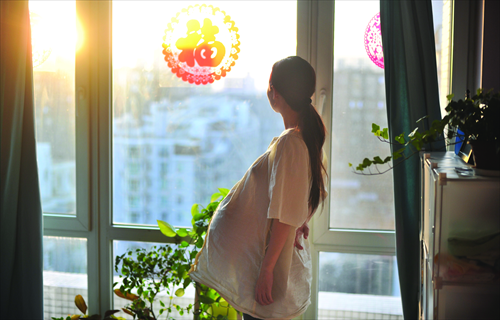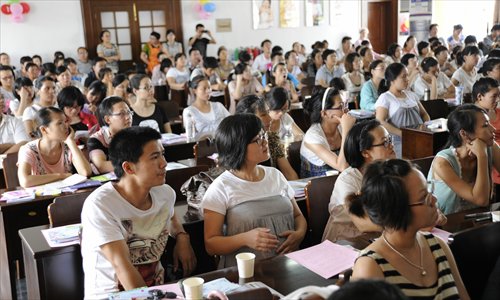Superstition, policy change give rise to baby boom in the Year of the Horse


Pregnant women and their partners at a childbirth class. Photos: CFP and IC
"My parents-in-law didn't explicitly say that they didn't want a grandson or granddaughter born in the Year of the Sheep, but they dropped plenty of hints," said Guo Dongdong, five months pregnant. "The saying in our hometown is that girls born in that year turn their families poor."
Guo, nearly 30, works at a cultural company in Beijing and seems an unlikely figure to be influenced by millennium-old superstitions. But, like tens of thousands of other mothers across China, she was keen to have a child in the present Year of the Horse, widely seen as auspicious, rather than in the unlucky Year of the Sheep that starts on February 19, 2015.
An old Chinese saying, "Shi yang jiu bu quan," meaning nine out of the ten people who are born in the Year of the Sheep will suffer greatly, is still popular today in many parts of the country. Statistics for births this year aren't yet available, but hospitals report wild overcrowding, with women needing to sign up earlier and earlier to find a place in top-tier facilities.
Previously, 2012's Year of the Dragon saw another small boom, with statistics from the Beijing Health Bureau showing a five-year peak and Shanghai reporting about 5,000 extra births.
But the combination of the noble Horse and the looming threat of the Sheep seems to have sent Beijing's mothers into a panic, leaving mothers like Guo struggling to find a place to give birth.
Standing while pregnant
The registry at the Beijing Hospital begins at 7:30 in the morning, but Guo's husband usually leaves home at 5:30 or even earlier to stand in the queue, Guo said. Furthermore, these normal monthly antenatal examinations don't begin until the 12th week of pregnancy, this year in Beijing the struggle to find a place to give birth starts as soon as conception is confirmed.
Her visit is also divided into two or three trips because there are so many people and little time for each. But Guo is lucky compared to a large number of pregnant women, who are still struggling to establish files in the public hospitals in order to give birth there.
"This year for our hospital, pregnant women need to establish their files during the fourth or fifth week of pregnancy," said Sun Qin, head nurse at the 306th Hospital of the PLA, one of the hospitals rated AAA in China's strictly tiered medical system, "After six weeks it's impossible, which is six weeks earlier than in previous years."
The maternity ward of every AAA hospital in Beijing is now full. In the case of specialist hospitals like Beijing Obstetrics and Gynecology Hospital and Peking Union Medical College Hospital, which are popular with pregnant women, the women now have to get their files in before the first month of pregnancy is over, a month earlier than last year.
While flocking to the same year to have babies intensifies the resources usage in different hospitals and causes much inconvenience to these women, parents need to be prepared for even worse scenarios in the future, the fierce competition among those children when they are born, go to school, apply for colleges, get employed, or even get married.
According to the figure from bj.95081.com, the Beijing housekeeping service platform, this November will be a peak for the employment of yuesao, (nannies employed to look after newborn babies and their mothers), with their payment reaching over 10,000 yuan ($1,611) per month.
"Nannies in our company have been booked to February next year, demand for them in the second half of this year increased 20 to 30 percent than last year," said a stuff surnamed Chen at the Yiyingbao Nanny Service Company. "Those pregnant women booking late to early next year are mainly giving birth to their 2nd child after the policy loosens lately," Chen added.
Root deep superstition
In formal Chinese astrology, the year was seen as only one component, and a small one at that, of a person's horoscope. The month, day, and hour of birth are just as important. In popular culture, however, the threat of the Year of the Sheep continues.
This is not a new pattern. At the end of last Year of the Horse in 2002, Duan Tao, vice-director of the No. 1 Shanghai Maternity and Children's Health Hospital told China.org that about 10 percent of mothers at the hospital had asked for Caesarean sections, already far more common in China than elsewhere, so that they gave birth before the New Year.
There are many idioms praising the horse in China. But the sheep doesn't receive such praise instead, seen as weak and foolish. Those born in the Year of the Sheep are popularly supposed to be soft followers rather than heroic leaders.
"It's unscientific to connect people's fate to their year of birth," said Tao Lifan, an expert from the Chinese Folklore Society, "There are people born in the Year of the Sheep who are very successful, and there are also those born in the Year of the Dragon who suffer many frustrations in their life."
People's Daily wrote that the view of shi yang jiu bu quan might have been a rumor started to overthrow the reign of Dowager Empress Cixi (1835-1908) in the Qing Dynasty (1644-1911). Because she was born in the Year of the Sheep, so people started saying those born in that year had bad luck.
A search on Baidu.com turned out many refutations, yet, many young people are being affected by the superstition.
Qilu Evening News reported that a 23-year-old woman surnamed Huang in Heze, Shandong Province was being forced by her mother-in-law to have children this year. She had only been married for a month.
Her mother-in-law even said if she couldn't have the children in the Horse year, then she should wait a year, in fear it will be born in the Year of the Sheep.
Practical reasons
Hospital staff say that there may be a more practical reason than fears of baaing children. Older mothers are rushing to have second children after a loosening of the family planning policy earlier this year by most local authorities.
On February 21, the Beijing government loosened up the One-Child Policy, declaring that if just one of the two parents is a single child themselves, the couple can have two children. Including Beijing, 29 provinces and municipalities have implemented the same policy.
According to figures provided by the National Health and Family Planning Commission, from November last year to May 30 this year, 271,600 couples have applied to have a second child and 241,300 of them have received permission.
"Many mothers are having a second child this year, thanks to the loosening of the policy," said Sun. "Most of them are between 35 and 40, and some are so eager that they are trying every method to get pregnant
In some spots outside of Beijing, there's even more of a rush. "In our hospital there has been an obvious increase of pregnant women since April," said Gao Hong, head of the gynecology and obstetrics at the Wujiang First People Hospital in Jiangsu Province, "They are mostly around 35 years old, and each month the number is 50 to 100 more than previous year."
"I don't think zodiac signs are a particular concern among those pregnant women, there will be more of them next year," Gao added.
Newspaper headline: Foal Play